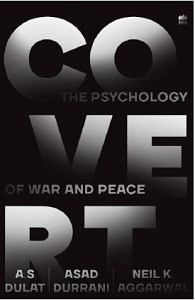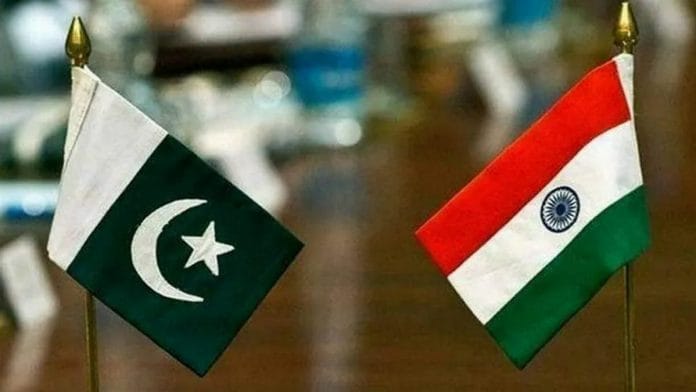Aggarwal: What obstacles did you both encounter in intelligence work?
Durrani: First, let me go back to your previous question. I might miss answering it later on: the key qualities of an intelligence chief.
Aggarwal: Please, go ahead.
Durrani: In India people rise from the ranks through merit and take over IB or RAW. In our case, a person can be appointed to such posts at the pleasure of the chief executive of the country or the army. So, we do not always follow the criteria of who would make a good ISI chief.
But my experience was the same as Dulat Saheb’s. If you act based on the opinions presented to you by your subordinates, play safe and don’t make your own assessments, then you are not likely to be a great chief. After getting the inputs of your subordinates, you should make your own briefs, and chart your own course—and take responsibility for it, regardless of success or failure. Then it is quite likely that if you are not sacked you will go down in history as having made a difference.
Thinking within the establishment, police officers are usually cut out to be better intelligence hands than military men, because a policeman lives with the people, he deals with the people, his instincts have been groomed in a manner that he understands the people. The military is isolated from the general public.
As I said, if you are going to be dependent on your subordinates to give you guidance, you’re no good. But now that the job has come to you, use your instincts and give it your best shot. I could have marked time. Frankly, I went there as an interim head of the ISI: ‘Yeah, keep the seat warm until we find someone else.’ But that year and a half was such an enriching experience.
And the blessing is that after you have retired, you keep meeting people like Mr Dulat, again accidentally. Because one continued on that track which one could easily have left. In time, one saw there was some merit in whatever destiny handed one.
One had to go against conventional wisdom, tradition and laid-down norms which make one stop oneself. We’re stuck. I’ve said that very often. We’re stuck because we do not think that people are going to think out of the box. One says, ‘Someday we will.’
That is what you probably wanted from your last question to me—what advice one would give. If you think that something different needs be done, then do it. This is your chance. One doesn’t get this chance very often.
Aggarwal: One hears at times about maintaining double lives, running other officers or feeling isolated from other people in intelligence work. Without revealing any sort of national security secrets, which of these did you experience and how did you deal with them?
Durrani: Very normally in my case. I again got lucky. Once the job came to me, my family—my wife and children—decided, ‘Now you have this job, we will give you all the time so you can concentrate on it.’ So, I was running only one life, and that was my professional life. Nothing else came in the way. Everything else was being taken care of by the rest of the family. I did not have to live two lives.
Aggarwal: Dulat Saheb?
Dulat: You know, this question of double lives and triple lives goes along with the job in some ways. Not everything that you know or do is known by others. I was determined to keep my private and personal life quite distinct from my official life, and I did manage to do this from the start. When I came home, I left the office behind.
My wife was very supportive in this. I’ll give you an example. All of us who have been in these jobs go through at least a couple of difficult times or crises. That happened at the end of 1999 when we had the hijacking of IC 814. It was one long week of a lot of stress because nobody knew how this whole thing would end. But when it ended on 31 December and the hostages were brought home, I went home and told my wife, ‘Let’s sit by the fireside. I need a cognac. Let’s just sit down and have a drink.’ We sat down together, had a drink and brought in the new year. She didn’t ask a thing.
It still keeps coming back to haunt you. This is a part of that life. Not everything goes right. Not everything goes correct. But you do it to the best of your ability.
I mentioned the RAW earlier. I thoroughly enjoyed myself. I made good friends also. But what people in the RAW thought of me, you have to ask them. I don’t have an honest answer about that. In fact, in my career at the time, maybe I thought that I was neither fish nor fowl. I never completed my career in the IB. In the RAW, I was an outsider. Like General Saheb, I decided, ‘I’m alone in this game right now. Suddenly from having the full support of an organization, I’ve come to a place where I’m on my own.’ And I said, ‘I will deal with it on my own.’ Good, bad, indifferent, whatever it was, I never sought anybody’s help.
I made it quite clear to my colleagues in the IB when they told me ‘You’re one of us,’ that though I still felt like one of them, now I was not an IB man—I headed the RAW and it came first for me. This is a question [of loyalties] I was asked many times. I was the first one to have served in both organizations.
Even now, I am asked, ‘Which is the better organization?’ They are both very fine organizations. The IB is more homogeneous. It’s solid—it’s been around for more than a hundred years. The RAW is comparatively new. But officer to officer, man to man, it is as good as the IB.
All I can say is that it is not a bad career. It is not a bad life. And yet, when I left the government in 2004, I had the option to stay on, but I thought, it’s time to leave. One of the things about government that never went down well with me was the suffocating restrictions around you.
Durrani: Mr Dulat is a very lucky man. I wish I could do that: leaving the office behind and coming home to family. For that year and a half, whenever I got home, my office came home with me [smiles]. Maybe I could not handle things as efficiently. Or maybe it was because of the multidimensional nature of the job. You have the military, you have the civil, you have Afghanistan, you have all those things, whatever was happening. The saving grace was that not once in that year and a half did my family complain, ‘You’re not giving us enough time.’
I once asked my German counterpart, ‘You go home over the weekend. Your headquarters are in Munich. Does anyone bother you?’ He said, never. Here it was unthinkable to not get a call in the middle of the night, over the weekend, all the time. That’s why I say that I envy people who can lead a professional life as well as a family life while having their job. I could not do it.
 This excerpt from ‘Covert: The Psychology of War and Peace’ has been published with permission from HarperCollins India.
This excerpt from ‘Covert: The Psychology of War and Peace’ has been published with permission from HarperCollins India.






